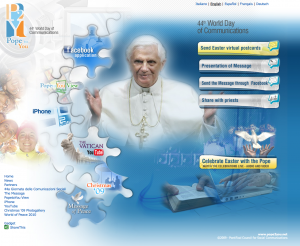The Church exists to evangelize. And today, the Church has a great opportunity to use new media to evangelize the whole world.
As Christians, we must take the gospel seriously. After all, the gospel is the good news of Jesus Christ. It is the message of salvation for those who receive it in faith. St. Paul emphatically proclaimed the primacy of the gospel in the life of the Christian, demonstrating that we are not only to live the gospel, we are also to spread it. Of himself he said, “Woe to me if I do not preach the gospel” (1 Cor. 9:16). In a very real way, to be Christian is to evangelize. The Church exists to evangelize.
Preaching, spreading the good news, sharing the gospel, can be done in different ways. St. Francis of Assisi, who lived in the 1200s, once told his brothers, “Preach the gospel everywhere you go. And, when necessary, use words.” In other words, his brothers were to live the gospel. Their lives and actions were to do the preaching for them. Those with whom they came in contact should have been able to see Christ in them. St. Francis wanted his brothers to evangelize with deeds.
The same could be said about us. Not all of us are called to be preachers. Not all are called to be missionaries. Not all priests. But all Christians are called to live the gospel, to be so radically transformed by the power of the gospel that others can see Christ living in us. It sounds like a tall order, I know. But this is the call. To be Christian is to evangelize.
Just a month ago, Archbishop Claudio Maria Celli, president of the Pontifical Council for Social Communications, made a few enlightening comments regarding the use of new media to spread the good news, to evangelize. He noted that the “…Church has a ‘great opportunity’ to use new media to evangelize and spread gospel values, especially among young people…” (see Vatican official calls for ‘pastoral conversion’ on new media)
Archbishop Celli noted that when it comes to new media, it’s not all about the new shiny tools. One of the things he said that I find most intriguing, especially for many “church folk” is this: “We are talking not just about instruments but about a real culture created by a communicative complexity that has never before been seen in history.”
Whoa. Big words. What does he mean?
He means that what we seen happening in the “virtual” world is real. The means of communication is different. Computers instead of face-to-face (or even telephone). But the content of what is happening is real. It is real communication between real people. It is real community. Real culture. And because it is real, the Church has to be there.
Will the online world ever replace the real world? No. The real world trumps the virtual world every time. But that does not mean that what happens online is not real. And what’s more important, Archbishop Celli acknowledges the fact that, as Christians, we have to be online. If we are to evangelize, we have to be where the people are. Today, people are online.
He went on to discuss the necessity of training for Church workers in the use of new media, noting that training for seminarians is urgent. “Without priests – and then without bishops – who understand modern culture, there will still be a communications divide which will not favor the transmission of the faith to the young in the Church.”
The “transmission of the faith.” It’s evangelization. And like all evangelization, if it is to be effective, it must meet people where they are, and it must make sense to them.
Ultimately, to evangelize is to take to heart the great mandate that Jesus gave us as he ascended into heaven. “Go, therefore, and make disciples of all the nations…” (Matt. 28:19). To evangelize is to share the good news of Jesus Christ with everyone we meet… wherever we happen to meet them. Even online.
How is your parish or diocese or ministry evangelizing online?
